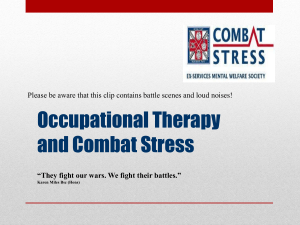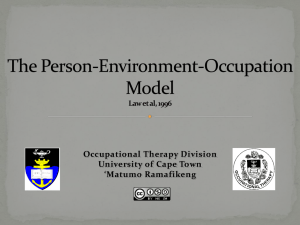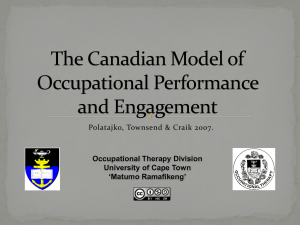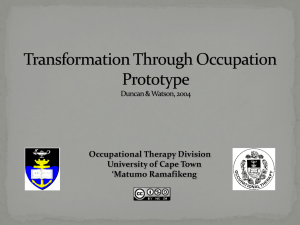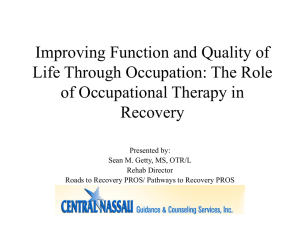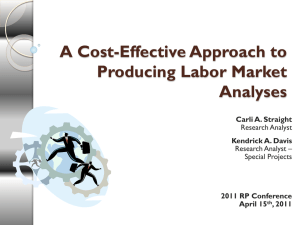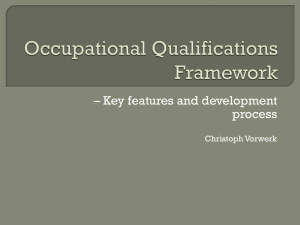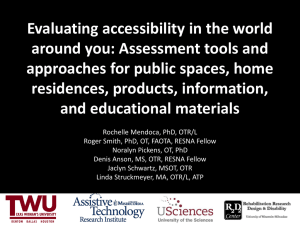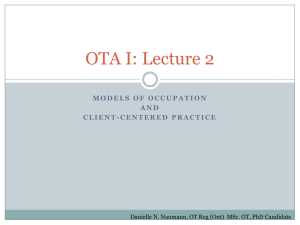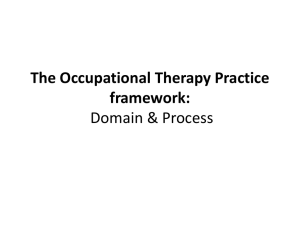作业表现 - 重庆城市管理职业学院课程学习中心
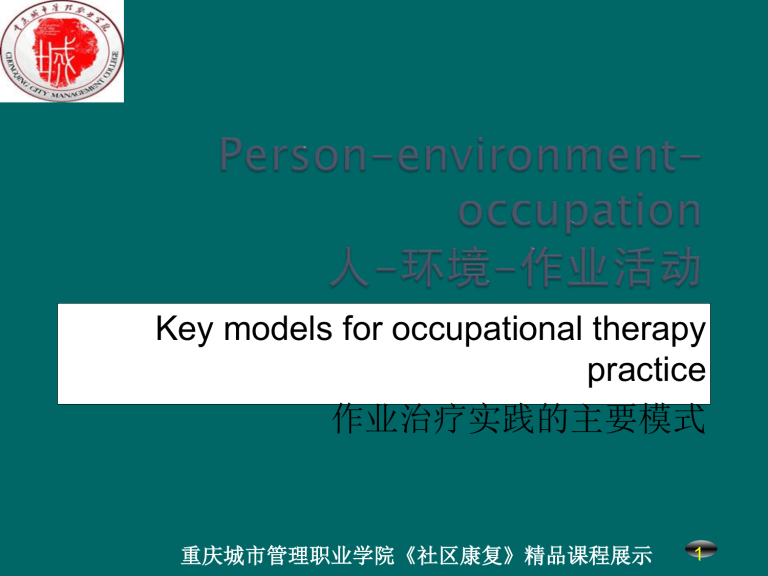
Key models for occupational therapy practice
作业治疗实践的主要模式
重庆城市管理职业学院《社区康复》精品课程展示 1
• P-E-O Model 人 环境 作业活动模式
• CMOP: Canadian Model of Occupational
Performance 加拿大作业表现模式
• Lifespan view of the P-E-O
人 环境 作业活动模式的人生观
• CMOP-E: Canadian Model of
Occupational Performance and
Engagement
加拿大作业表现和参与模式
2
Occupational Performance 作业表现
人 环境 作业模式
P-E-O Model
Person 个人
Environment 环境
Occupation 作业活动
Enabling Occupation: An occupational therapy perspective . (2002) p.47, adapted from
Fearing, Law, & Clark, Canadian Journal of Occupational Therapy 64, p.11)
重庆城市管理职业学院《社区康复》精品课程展示 3
人
作业表现
环境 作业
重庆城市管理职业学院《社区康复》精品课程展示 4
人
境
环
作业
人与环境界面
安全问题
家庭的支持
顾客所喜欢的资源、
及其可靠性
社区资源的合格标准
作业与环境界面
环境的布置与空间
可获得的工具和材料
在社区可获得的购物、
做饭方面的资源
人与作业界面 :
完成作业活动所需的技
巧和能力
自主方面的动力
对作业活动的需求和享
受
重庆城市管理职业学院《社区康复》精品课程展示 5
World Federation of Occupational Therapists
对个体的作业构成的评估
找出作业表现方面的长处和问题
对作业活动的评估 对环境的评估
把所收集到的资料放在一个相互关联的架构上去考虑,
与顾客一起制定治疗计划
测量作业表现来作为疗效的判断
环境 人
作业表现
作业
重庆城市管理职业学院《社区康复》精品课程展示 6
World Federation of Occupational Therapists
重庆城市管理职业学院《社区康复》精品课程展示 7
重庆城市管理职业学院《社区康复》精品课程展示 8
作业表现随健康状况改变
要详细了解PEO模式的内容,请参考下列的录像内容 http://www.rehabupdates.net/guangpan/index.asp?id=11
P E P P E
O
O
O
重庆城市管理职业学院《社区康复》精品课程展示 9
Canadian Model of Occupational Performance 加拿大作业表现模式
制度
文化
环境
生产活动
情感
社会
物理
自理
作业活动
精神
认知
身体
休闲
重庆城市管理职业学院《社区康复》精品课程展示 10
• The model is used to illustrate that occupational performance is the result of the dynamic interactions between
• 该模型呈现了作业活动的表现是以下三者
之间互动的结果
Person 人
Environment 环境
Occupation 作业活动
重庆城市管理职业学院《社区康复》精品课程展示 11
• Physical: e.g. range of motion, muscle strength, grasp, muscular and cardiovascular endurance
• 身体:例如关节活动度、肌力、抓握、肌肉和心血管的耐力
• Cognitive: e.g. thinking, perceiving, recognising, remembering, judging, learning, knowing, attending and problem solving
• 认知:例如思维、感知、认识、记忆、判断、学习、了解、专注和解
决问题
• Affective: e.g. subjective feeling, internal experiences, values, motivation, mood, conation/drive
• 情感:例如主观感觉、内在的经验、价值、动机、情绪、意欲 / 欲望
Spirituality: Essence of the person, the essential core of “being”
精神:人的本质、“生存”的基本核心
重庆城市管理职业学院《社区康复》精品课程展示 12
• Self care: personal care( dressing), functional mobility( transferring), and community management (shopping)
• 自理:个人自理(穿衣)、功能性的行走(转移)和社区
的管理(购物)
• Productivity: Paid/Unpaid work( teacher/volunteer), household management (cleaning), play/school
• 生产活动:受薪 / 不受薪
工作(教师 / 义工)、家务管理(清洁)、玩耍 / 上学
• Leisure: quiet recreation (reading) , active recreation
(hiking), and socialisation (visiting friends)
• 休闲:静态的娱乐(阅读)、动态的娱乐(徒步旅行)、
社交(探访朋友)
重庆城市管理职业学院《社区康复》精品课程展示 13
• Institutional: e.g. legal, economic, and political
• 制度:例如法律、经济和政治
• Cultural: e.g. traditions, rituals, ceremonies, foods, customs, attitude, and beliefs.
• 文化:例如传统、仪式、庆典、食物、习俗、态度和信仰
• Social: e.g. relationships with individuals, family, friends and Groups
• 社会:例如与个人、家庭、朋友和人群的关系
• Physical: e.g. climate, Constructed, Terrain,
Temperature, Objects
• 物理:例如天气、建筑、地形、温度、物件
重庆城市管理职业学院《社区康复》精品课程展示 14
Canadian Model of Occupational Performance 加拿大作业表现模式 CMOP
制度
文化
环境
生产活动
情感
社会
物理
自理
作业活动
精神
认知
身体
休闲
重庆城市管理职业学院《社区康复》精品课程展示 15
Canadian Model of Occupational Performance and
Engagement 加拿大作业表现和参与模式 (CMOP-E)
我们所关注的具体范畴
Transverse View 纵切面观
环境
作
业
人
作业
范畴
重庆城市管理职业学院《社区康复》精品课程展示 16
• The CMOP-E is an extension of CMOP, with the inclusion of the engagement perspective.
• CMOP-E 是 CMOP 的延伸,包括了参与方面的内容
• Engagement 参与
– It recognises the commitment made to performance in occupations as the result of Self-choice, motivation and meaning. (AOTA, 2002)
– 指的是在自我选择、动机和有意义的情况下投入到作业活动的表
现中
– Occupational engagement captures the broadest of perspectives on occupation; engage encompasses all that we do to involve oneself or become occupied
– 作业参与包含最广泛的作业活动方面的范畴;参与到所有我们自
己做的事情中或被占据
重庆城市管理职业学院《社区康复》精品课程展示 17
• Transverse view in this model-with occupation as central premises ( blue colour in figure1.3 )-presents occupation as our core domain of interest, showing that occupational therapists are concerned with what is related to human occupation and its connection with the occupational person and the occupational influences of the environment
• 在该模式的中央 -作业活动(如金字塔形状)部分作一个
纵切面(参看幻灯 16 中的图 1.3
),右侧蓝色的双箭头部
分显示的是作业活动,这就是我们最感兴趣的部分,作为
作业治疗师,我们关注的是与人类作业活动相关的东西,
以及进行作业活动的人和环境对作业活动的影响之间的关
系。
(Townsend & Polatajko, 2007) 18
• In this model, OT concerns with human occupation are not only regarding the actual performance of an occupation, but also with the level of importance it holds or the degree of satisfaction it brings to the individual, family, group or organization.
• 在该模式中,作业治疗师关注的不只是在现实生活中进行的人类作业
活动,同样关注作业活动本身所包含的不同层次的重要性,或者说作
业活动给个体、家庭或机构所带来的不同程度的满足感
• Occupational therapists are also concerned with potential and possibilities for occupational engagement as indicated by occupation-person-environment interactions.
• 作业治疗师也同样关注由作业 人 环境之间的互动所显示的作业参与
的潜力和可能性
重庆城市管理职业学院《社区康复》精品课程展示 19
Occupation is used in occupational therapy both:
作业活动在作业治疗中有两方面的用途
As means 作为媒介 As goal 作为目标
• The therapeutic use • The goal of the OT of occupation as a
“means” or method of intervention process is to improve the changing client’s engagement performance.
in meaningful
• 作业活动的治疗性应
用,作为改变作业表
现的“媒介”或方法
• occupation.
作业治疗的目标是改
善顾客在有意义的作 20
业活动上的参与性
Task: 任务
• How do I ensure my practice is occupation based and how can the Canadian Model of Occupational Performance and
Engagement (CMOP-E) be applied in practice?
• 我如何确保我的临床实践是以作业活动为
基本,如何在实际工作中应用加拿大作业
表现模式和加拿大作业表现和参与模式?
21
